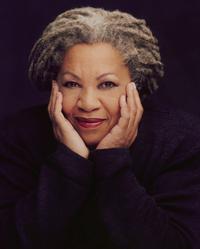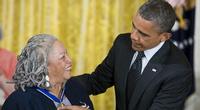When I first read The Bluest Eye by Toni Morrison, at 15 years old, I knew it would haunt me. The story fed my soul—I was shocked at its lovely, yet stinging taste, but realized I had always been craving it. Never had my struggle with society’s portrayal of white beauty and embedded racism been described so well. With a writing style that’s mixed with violence, beauty, and tragedy, Morrison captured chaotic emotions and pulled back their layers.
Upon hearing about Morrison’s death, I closed my eyes, unsettled at the thought of a world without her.
But, she will never be completely gone.
Morrison’s legacy includes children’s books, essays, and 11 novels. She visited the Free Library no less than 5 times between the years 1996–2015 (you can find and listen to these conversations in our Author Events podcast archive). You can view her appearance from 2015, discussing her then-newest book God Help the Child, on our Author Events YouTube channel.
She was the first African-American woman to win the Nobel Prize in Literature, cementing her place in history. Her most well-known novel is Beloved, a powerful story that explores the terrible marks of slavery and its losses, which won the Pulitzer Prize in 1988. Song of Solomon, one of my other favorite works by Morrison, is a unique coming-of-age story that explores how the past clings to the present, the actions of ancestors hovering over their descendants. Once you read her work, the language and themes will stay with you, calling you back—and you will never be able to resist revisiting them.
Dissecting the dark underside of American society and human nature, Morrison’s fiction moves through time and transforms in ways that mirror dreams—unpredictable and hazy, yet revealing truths that are discovered in the fog. Sometimes playing with our idea of reality, she will introduce ghosts or magic, warping our understanding of the world she’s created. Much of her work explores the weight of history, especially slavery and racism, and how it results in the present-day. Despite the poetic and lovely quality of her writing, Morrison’s stories depict violence, sexual assault, murder, and more, in great detail. In other words, there is beauty in the world, but there can also be deep ugliness.
Morrison’s analyses of race, family, history, and identity focus on how the consequences of history are passed onto the following generations. She championed independence and never hesitated to speak out against wrongs. Her work has made a meteor-like impact, changing the literary world and offering a powerful voice for the African-American community. She may have passed away, but her legacy will remain, inspiring and enlightening many generations to come.
As she said during her Nobel Prize lecture in 1993:
"We die. That may be the meaning of life. But we do language. That may be the measure of our lives."
Thank you, Toni Morrison. Your words will carry on, for many years to come.
Have a question for Free Library staff? Please submit it to our Ask a Librarian page and receive a response within two business days.



